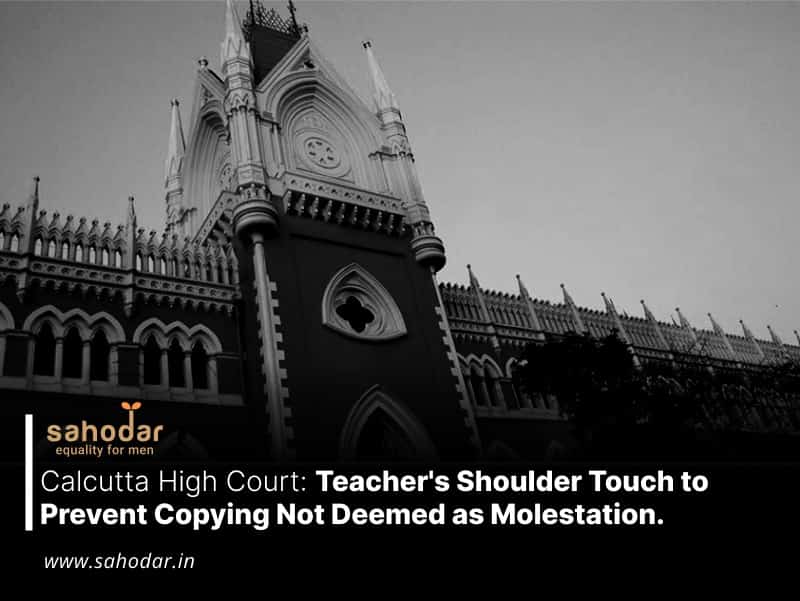The matter concerned a challenge to disciplinary action taken against the teacher. A bench led by Justice Suvra Ghosh ordered the teacher’s reinstatement and even imposed a cost of ₹10,000 on the school authorities.
The recent decision by the Calcutta High Court says that when a teacher touches a student’s shoulder to stop them from cheating during exams, it’s not considered molestation. This case is known as Anil Kumar Mridha vs. Union of India.
A group of judges, including Justices Suvra Ghosh and Subhendu Samanta, overturned a previous ruling by the Central Administrative Tribunal (CAT) from April 8, 2018. The CAT had supported the decision to fire a government school teacher.
The court emphasized that the teacher’s action, which was claimed to be molestation, was the reason for his dismissal from the government job due to alleged misconduct.
“Restraining the victim from copying in the examination by touching her shoulders from behind can under no stretch of imagination be termed as misconduct, more so, since the victim herself has not termed such action to be inappropriate or malicious. For the said reason the penalty imposed upon the petitioner is also utterly disproportionate and has no legal sanction,” the Court said.
The bench underscored that the petitioner’s action of touching the student’s shoulders from behind with the sole purpose of preventing academic dishonesty during an examination lacked any sexual connotation.
In light of this determination, the Court issued an order for the reinstatement of the petitioner into his former position, entitling him to full back wages and the associated benefits.
Furthermore, the Court imposed a penalty of ₹10,000 on the relevant authorities.
The petitioner, Anil Kumar Mridha, had previously been terminated from his employment by the disciplinary authority on the grounds of allegedly molesting a class 8 student through the act of touching her shoulders from behind in November 2009.
The bench observed that despite the petitioner’s acquittal in the criminal case due to a ‘compromise petition’ filed by the student, the disciplinary authority maintained its stance that the compromise petition, jointly submitted by the student and the petitioner, could not be invoked in his favor on the grounds that minors lack the legal capacity to enter into contracts.
“It appears that the petitioner was acquitted from the criminal case on the anvil of a joint compromise petition. The compromise petition cannot be termed as a contract. It clearly demonstrates that the petitioner is innocent and the complaint was falsely lodged against him by the victim,” the High Court noted.
The Court additionally noted that while the victim had initially testified that she was molested by the petitioner, she later retracted her statement and clarified that the petitioner had merely touched her shoulder from behind when she was copying during the examination.
“So also is the version of the victim herself who has in no uncertain terms stated that the petitioner held her by her shoulders when she was copying in the examination. The victim has not for once indicated that the said touch was with sexual intent or inappropriate,” the bench said.
Although the authorities endeavored to convey to the Court that the petitioner had faced penalties on the grounds of misconduct rather than molestation, the specifications outlined in the charge levied against him revealed that the misconduct charge was fundamentally rooted in the prior allegation of molestation. It should be noted that the petitioner had previously been exonerated of this molestation charge in a criminal court.
“It says that the petitioner committed gross misconduct unbecoming of a government servant inasmuch as he molested one girl student. In other words, the allegation of misconduct is solely on the anvil of the alleged act of molestation,” the bench observed.
Consequently, the bench observed that it was ultimately the alleged act of molestation that had been categorized as misconduct on the part of the petitioner.
In light of the petitioner’s prior acquittal in the molestation case, the Court emphatically articulated that any disciplinary action founded upon such allegations was legally unsustainable.
“There is not an iota of evidence on record that suggests misconduct on the part of the petitioner. The statement of the victim is exonerative in nature and gives a clean chit to the petitioner. The decision of the authorities is based on no evidence at all and no misconduct resulting in violation of the service rules has been substantiated against the petitioner,” the bench held.
Based on these considerations, the bench annulled the Central Administrative Tribunal (CAT) order and mandated the reinstatement of the petitioner by the authorities. Furthermore, the bench imposed a pecuniary penalty of ₹10,000 upon the said authorities.

